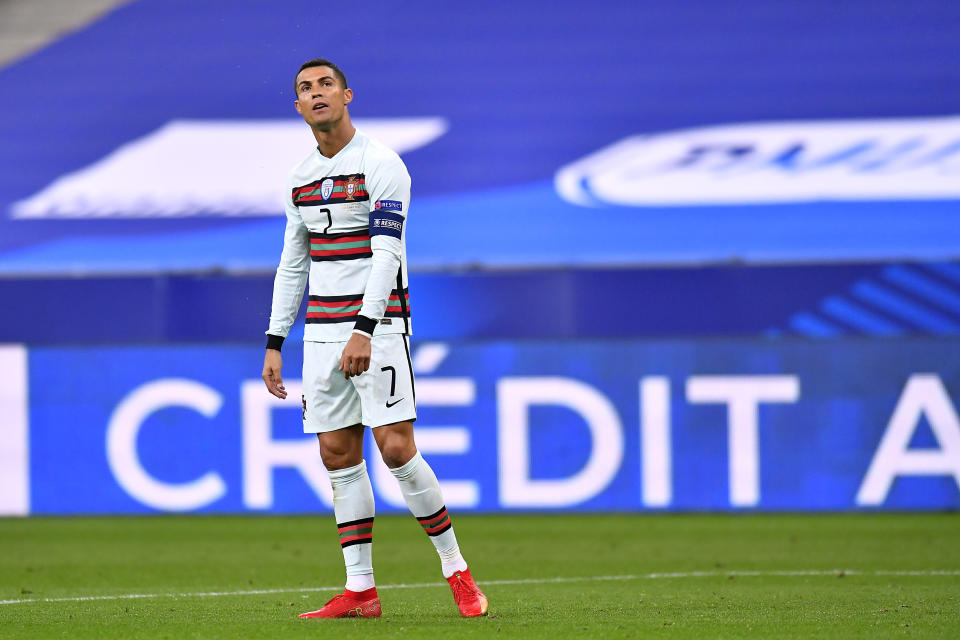Ronaldo's positive COVID-19 test should be a wakeup call, but we probably already know how soccer will respond
Cristiano Ronaldo is the latest sports superstar to contract COVID-19 after testing positive on Tuesday, although the Juventus and Portuguese forward remains asymptomatic.
The 35-year-old played for Portugal against France on Sunday and will now miss a game against Sweden in the Nations League, a competition run by European soccer’s governing body UEFA, in addition to a Juventus game or two.
There is no telling where he contracted the virus. Juventus, which had two coronavirus-positive staffers, says Ronaldo tested negative up until his departure for Portugal’s camp for the international break. There is also no telling whom he might have given it to, although Portugal says every other player in the squad tested negative on Tuesday.
Ronaldo’s positive test offers a stark reminder that Europe and soccer remain very much in the thrall of the pandemic. It underscores, too, that perhaps not every game is equally important and that the necessity of playing them should be considered more carefully.

Granted, it’s entirely possible that Ronaldo, who was spared infection during Turin’s roaring outbreak in the spring, contracted the disease before leaving for Portugal duty. But international soccer represents a needless risk all the same. Unlike club soccer, be it the domestic leagues or continental competitions, it is inessential to sustaining the business of professional soccer. As it was argued in this space last week, only the final round of Euro 2021 playoffs had any urgency to be played, and even those could have been put off a few more months.
There was no good reason to play friendlies in this window. And the various continental Nations Leagues could just as easily have been shelved for a year, without significantly damaging the sport. (TV broadcast contracts could have been fulfilled in other ways down the line.)
Sending all of those players scurrying around the world, mixing the bubbles and pods the clubs have carefully maintained, always represented a danger to the game at large. Ronaldo is hardly the only player to have become infected during this international break. And he isn’t the first of the game’s high-wattage stars to get the virus either; Neymar, Kylian Mbappe, Paul Pogba, Zlatan Ibrahimovic and several other men you might have seen in TV commercials became victims previously.
Regardless of the origins of Ronaldo’s infection, the rash of new positive tests among national team players — members of the national teams of Ukraine, Peru, Switzerland, Spain, Senegal and other countries have missed games with this window because of COVID-19 — vindicates concerns their clubs held all along.
They were vehemently opposed to releasing their players to the national teams for fear of the virus spreading among their squads, both while they were away and when they returned, and incapacitating them for upcoming games. It is the clubs, after all, who pay the players’ salaries. They had the backing of international players association FIFPro and the European Club Association in this. But FIFA and UEFA forged ahead with the international window regardless, never mind a club schedule that had already been compressed into a shorter timeframe.
Ronaldo’s infection ought to serve as a wakeup call to the sport, just as the news somehow hits differently whenever a head of state tests positive. The virus does not discriminate according to fame or influence. The supremely professional and health-conscious Ronaldo isn’t immune either.
It will be telling how the sport reacts to this, and whether it redoubles efforts to keep its players safe. A surefire way to reduce risk would be for soccer to pare down its calendar where possible. And that probably means shelving international soccer altogether for the time being.
Sustaining even the club season has felt tenuous at times in the weeks since it kicked off. An outbreak among Paris Saint-Germain players early in the season confirmed that things remained perilous. The discovery of 15 positive cases among players and staff at Genoa has already proved disruptive to the schedule, with other games postponed or forfeited — such as in the curious case of the high-stakes Juventus-Napoli match in Serie A. Napoli had to miss the game because of its quarantine following its win over Genoa because Juventus, Ronaldo’s club, would not reschedule.
If the governing bodies cannot contain their avarice and remain intent on honoring every last game on the schedule as if nothing were going on, even when all the available evidence suggests that there is still very much something going on, they only increase their vulnerability.
And Ronaldo will hardly be the last of the sport’s faces to fall ill.
Leander Schaerlaeckens is a Yahoo Sports soccer columnist and a sports communication lecturer at Marist College. Follow him on Twitter @LeanderAlphabet.
More from Yahoo Sports:


